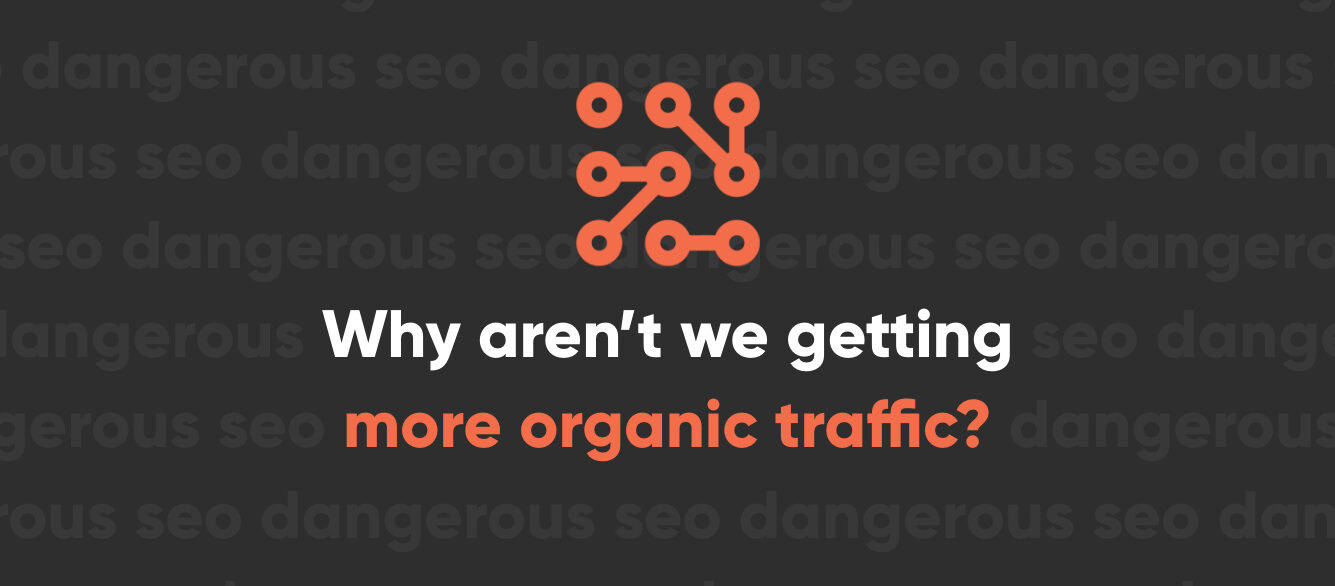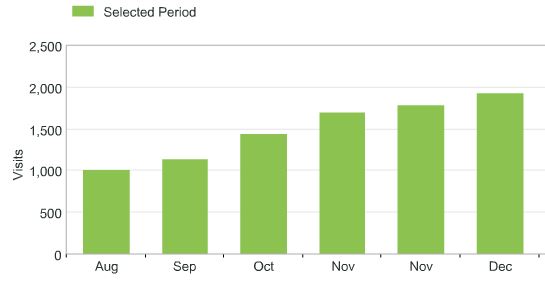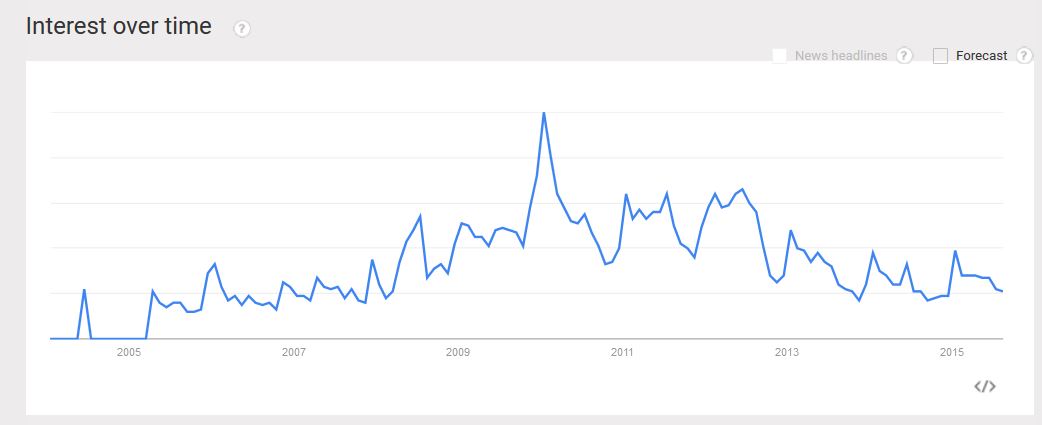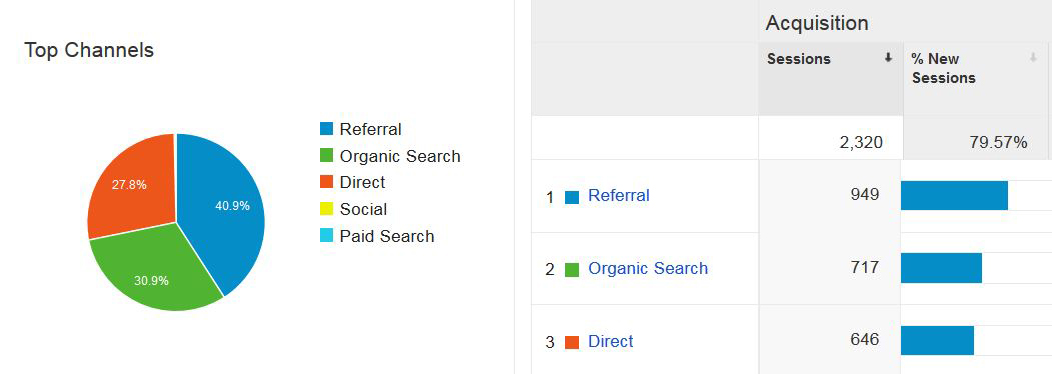
Why Aren’t We Getting More Organic Traffic?

You have a great marketing plan and top-notch search rankings. So where’s all your organic traffic? Shouldn’t it be going up all the time?

A lot of businesses live and die by organic search. A typical internet marketing plan may consist of this logic:
- Do SEO
- Get top rankings
- Get tons of traffic
- Make tons of sales
- Become billionaires
Okay, the last one might be a bit of a stretch, but we all have dreams, right?
Organic search is often a key part of business success. For many businesses, it’s the leading source of traffic. It also tends to have a higher conversion rate than other channels like referral or social. And that’s why you’re so desperate to get more of it.
No matter how much organic traffic we’re seeing in analytics, we always want more. And there’s usually more to be had. I’ve yet to see a campaign that’s completely maxed out on organic traffic. I’m looking forward to the day when I can say to a client, "You have a 100% share of the organic traffic in your industry. It literally can’t get any better."
Yeah, that’s never going to happen. There’s always more organic traffic out there for you. But that doesn’t mean your organic numbers are always going to grow in analytics. In fact, you may notice these numbers shrinking even if your rankings are steady.
Why Are My Organic Numbers Dropping?

When your organic search traffic goes down, the first thing you need to rule out is a drop in your search visibility. We don’t want to get too caught up on precise search rankings because they can be so fickle, but you still want to track everything closely—just don’t try to check your rankings by running a couple manual searches from your computer that’s logged into your Google account on a browser that’s stockpiling years of browsing history.
Once you’ve ruled out a ranking drop (or something worse, like your site being penalized or de-indexed), there’s something else important you should consider: the trends. Yes, it’s possible that people aren’t searching for your products and services as much as they were a few months ago. Or maybe they aren’t searching for you anymore at all. Your organic traffic can’t go up if people aren’t searching for what you offer.

Oh, and keep in mind that much of your organic traffic is from people who already know your company. There’s a good chance that the majority of your natural search traffic is branded. People are searching for your company name because they’ve heard of you before and that’s the easiest way to find you. If you had billboards plastered all over the world a few months ago and have since removed them all, then you shouldn’t be surprised by a drop in organic traffic. Your organic traffic is closely tied to your other marketing campaigns.
Maybe It’s Not You. Maybe It’s the Data
After you’ve ruled out all the potential causes behind a drop or stagnation in organic traffic, you need to consider the accuracy of the data. I’ve got some bad news for you: all your organic traffic isn’t in your organic traffic report. And it never will be.
You see, no matter how amazing your analytics tools and your data team are, there are some flaws with the numbers. That channel data you’re looking at? It’s not 100% accurate. We’d like to think it’s pretty close, but there have been more than a few cases that have suggested otherwise.
Organic and Direct Collide
When you look at your direct traffic, you might scratch your head and wonder why so many people are coming directly to your site without passing Go first. Well, guess what? In many cases, they didn’t come directly to your site. In 2014, Groupon performed a pretty dangerous experiment—they temporarily removed themselves from Google’s index to see just how much this would affect their traffic. You won’t believe what they saw. Okay, you probably will because I haven’t created much suspense here. Obviously they saw a drop in organic traffic, but they also saw a huge decline in direct traffic. The conclusion: as much as 60% of direct traffic was actually organic.
Does that mean we should pull 60% of our direct traffic and toss it into the organic traffic report? While that might look good for an SEO campaign, it would be a complete misuse of the data. This was just one experiment conducted over a very short period of time. The results certainly weren’t conclusive, at least not in terms of the numbers. But in terms of principles, this case tells us something important: at least some organic traffic is getting thrown into the direct traffic bucket.

Should we just say that 388 of those direct sessions are actually organic? Yeah, organic is #1!
Sometimes It’s Technical
Recently, search marketers noticed a decline in organic traffic coming from Bing. At the same time, referral traffic from Bing was up. The good news here is that your overall traffic wasn’t affected (or at least we don’t think it was). The bad news is that it screwed up those channeling reports. It turns out this issue was related to Bing’s roll out of search encryption (yes, we’re getting closer to the days of absolutely no keywords provided). And it still hasn’t been fixed. The end result: you have less organic traffic than you might expect. And there’s little you can do about it.
What does all this mean? Well, your organic traffic isn’t just going to organic. It’s also going to direct and referral. Luckily, there’s no evidence that it’s going to social, paid, or email yet.
So what do we do with the data?
Some experts have gone as far as to say we should kill any metrics related to organic traffic. While that might be an extreme way of looking at it—hey, extreme brings the clicks—there is a point here. Relying too heavily on a piece of data we can’t control is a bit stupid. But that doesn’t mean we can’t use that data for something. It can still help us establish benchmarks, opportunities, and growth. And it can also help us identify potential problems. But, as with any data, you have to know how to use it.
Now get back to dominating the search results. Just don’t expect your organic search traffic to go up infinitely.
This post is part of Internet Marketing Mysteries, a weekly column addressing actual client questions related to SEO, analytics, website best practices, and any other topic connected to internet marketing. Have a question you’d like to see tackled in a future post? Let us know in the comments.

Nate Tower
Nate Tower is the President of Perrill and has over 12 years of marketing and sales experience. During his career in digital marketing, Nate has demonstrated exceptional skills in strategic planning, creative ideation and execution. Nate's academic background includes a B.A. with a double major in English Language and Literature, Secondary Education, and a minor in Creative Writing from Washington University. He further expanded his expertise by completing the MBA Essentials program at Carlson Executive Education, University of Minnesota.
Nate holds multiple certifications from HubSpot and Google including Sales Hub Enterprise Implementation, Google Analytics for Power Users and Google Analytics 4. His unique blend of creative and analytical skills positions him as a leader in both the marketing and creative worlds. This, coupled with his passion for learning and educating, lends him the ability to make the complex accessible and the perplexing clear.



